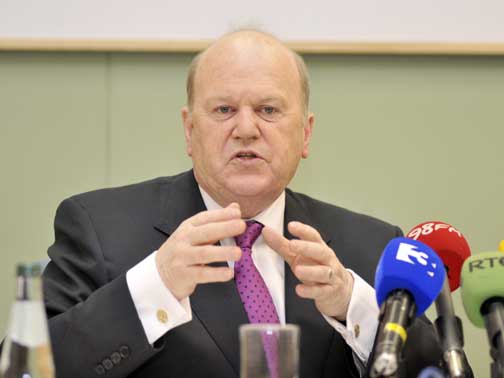


SERVICES
Tuesday July 26, 2011
Savings Of €1bn As Irish Bailout Rate Cut But Tough Budget Still Ahead
Finance Minister Michael Noonan has warned that despite the rate cut the government will still have to press ahead with a severe budget at the end of the year (Photocall) A new deal struck by European governments last week will result in savings of over one billion euro for the Irish taxpayer. Eurozone leaders agreed to cut the interest rate being charged on Ireland's EU/IMF/ECB €85 rescue fund by up to 2%. Britain, who along with Denmark and Sweden, provides Ireland with money as part of the rescue package has also agreed to reduce that rate it is charging accordingly. The interest rate cuts should come into force before the end of the year, and will apply to money already drawn down as well as future loans. Ireland will also benefit from the extension of the maturity dates on the loans to a minimum of 15 years and maximum of 30 years, giving us way more time to pay back the money. Taoiseach Enda Kenny said the EU debt summit was "a good day for Ireland". But his Finance Minister Michael Noonan warned that despite the good outcome, the government will have to press ahead with a severe budget at the end of the year. "I'm afraid we'll still have to face the music in December," said Noonan, who pointed out that Ireland's massive deficit still had to be reduced. The government is planning an adjustment of between €3.5bn and €4bn in the next budget. It must stick to the terms of the bailout deal in order to continue drawing money down. Mr Noonan said the interest rate cut was good news and the deal was a significant step. He said it meant Ireland would not have to return to the markets if yields on Irish bonds remained prohibitively high by the time the fund runs out. "There's a commitment that if countries continue to fulfil the conditions of their program, the European authorities will continue to supply them with money even when the program concludes," he said. "That takes the whole issue of a second bailout for Ireland off the table. "If we're not back in the markets, the European authorities will give us money until we're back in the markets." Ireland is currently paying about 6% interest on monies it gets from the troika. The reduction to 4% represents a major political victory for the new government, who had made an interest reduction a priority, and used the crisis in Greece to secure it. Taoiseach Enda Kenny was delighted that the deal came with "no strings attached" and that French demands for a rise in Ireland's corporate tax rate in return had been parked. |
CURRENT ISSUE

RECENT ISSUES


SYNDICATE
[What is this?]
POWERED BY

HOSTED BY

Terms of Service | Privacy Policy
Website Design By C3I






